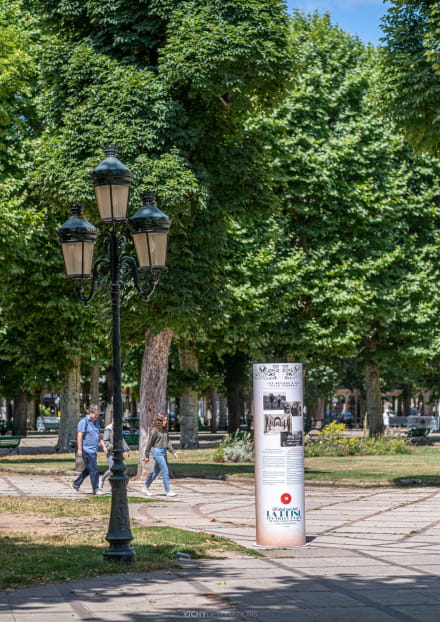While many of Vichy's landmarks owe their existence to Napoleon III, the Parc des Sources has a close link to his uncle, the Emperor Napoleon I. In 1799, his mother, Maria Letizia Bonaparte, came to Vichy for a health cure with one of her sons, and fell under the town's spell. But she noticed that there was a lack of space for strolling and that the area around the spa was cluttered with various buildings. "Napoleon I signed the decree imposing the development of this promenade while on retreat with his troops, in the midst of the Russian campaign," explains Alla Pikozh, Vichy Destinations' tour guide. The park quickly became a meeting place for everyone.
A vast renovation program
In response to this craze, large hotels were built around the park, and from the beginning of the twentieth century onwards, some of the biggest names in the industry moved in. Everything was done with the rich in mind. "Until the outbreak of the Second World War, 80% of the French population was made up of peasants. Those who traveled were wealthy people. So it made sense to target this clientele." It's a strategic location, at the heart of the town's spa activity. Like a beating heart. It was later enhanced with a gallery and enlarged with the construction of the Horseshoe in 1901. The Parc des Sources, purchased from the State by the city of Vichy in 2020, will undergo a vast program of restoration and renovation of its surroundings. An emblematic heritage feature of the spa estate, the Parc des Sources is to be restored. The aim? To give this area a new lease of life in keeping with the uses and identity of the spa and tourist city of the 21st century, as it has successfully done in the past.
Europe's largest terrace, serving 4,000 coffees a day
"One of the greatest entertainments of this age is showing off and showing off your costumes. The more beautiful your lady's dress, the richer you are." This was more difficult to do in Paris, where Baron Haussmann's policy of major construction projects between 1853 and 1870 generated a lot of dust. People grumble because they can only get around in horse-drawn carriages. "And so we can only show the upper part of the costume. Whereas in the water cities, as is the case in Vichy, you can get around on foot."
The venue quickly became the place to be, and grew rapidly. "In place of the current Grand Café, there was an establishment called La Restauration. Tables were installed to create a terrace on the park side. As demand grew, so did the number of tables. It was the largest café in Europe, bigger than the one in Vienna (Austria). In the late 19th and early 20th centuries, over 4,000 coffees were served every day. Portraitists and caricaturists sketch the physiognomies of spa-goers on the terrace, while inside, lounges offer the chance to play billiards or parcheesi, or watch film screenings.
UNESCO heritage
On the plans of the Vichy of the interwar period, the Parc des Sources is sometimes referred to as the "old park" or "ancien parc" - a curious distinction, given that it predates the "new" parks of the Allier by only 50 years, a mere minute for a town that is twice a thousand years old.
On the other hand, their landscape signatures are radically different. Whereas the Allier parks are partly based on the codes of English gardens, the current appearance of the Parc des Sources is more in keeping with the French tradition, with its string-patterned avenues forcing the random encounters of the Parisian elite at the waters. The regular alignment of the trees, the homogeneity of the species and the work on the perspectives serve to enhance the buildings.
The Parc des Sources is also the first act of the Bonaparte family in Vichy. Maria Letizia Bonaparte, who was in residence in 1799, is said to have encouraged her son, Emperor Napoleon I, to work towards the beautification of Vichy, which he did by ordering the creation of this park by decree in 1812.
The park underwent its last major transformations between the 19th and 20th centuries, when the Grand Établissement Thermal and the Opera Theatre were built. In 1970, painter David Hockney immortalized the Parc des Sources, which is about to undergo a much-needed facelift.
Periode d‘ouverture : Ouvert toute l‘année
All year round, daily.






